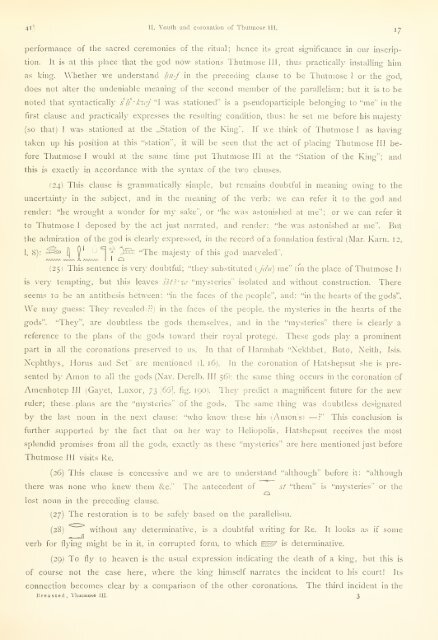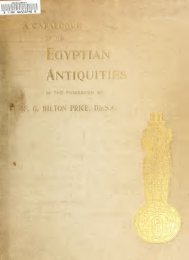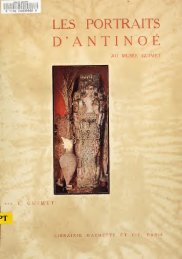- Seite 1 und 2:
-'^^ NYU IFA LIBRARY |||||!!lf|i|!|
- Seite 5:
UNTERSUCHUNGEN ZUR GESCHICHTB UND A
- Seite 8 und 9:
UNTERSUCHUNGEN ZUR GESCHICHTE UND A
- Seite 10 und 11:
und es sind wohl eher Ergänzungen
- Seite 12 und 13:
Anhänge zur ersten Abhandlung. I.
- Seite 14 und 15:
— I. Die Thrümvirren untrr den N
- Seite 16 und 17:
frem'lländischen?) ' 4. I. Die Thr
- Seite 18 und 19:
5 I. Die Thinuwirren unter den Xacl
- Seite 20 und 21:
X 1- Dio Tliniiiwirren uiit.-r den
- Seite 22 und 23:
lO I. Die Thronwirren unter den Nac
- Seite 24 und 25:
^ j-, I. Die Thronwnrroii iinr.r d.
- Seite 26 und 27:
is bis 14 I. Dif Thronwirren unter
- Seite 28 und 29:
l6 ' r>i
- Seite 30 und 31:
jg 1. Die Thronwirren unter (Ion Na
- Seite 32 und 33:
1 ^^^(_£>'äci] 20 I. Di'' Thronwi
- Seite 34 und 35:
I I I I. Dil- ThrniuvirrPM untor df
- Seite 36 und 37:
24 1- T^i'" TliKinwirrcn iintf>r il
- Seite 38 und 39:
2g I. Die Thronwirren unter den Nac
- Seite 40 und 41:
• '^^ I 28 I- Di'' Thronwirren un
- Seite 42 und 43:
30 I- Die Thromvirron unter den Nac
- Seite 44 und 45:
02 I. Die Thronwirren unter den Nac
- Seite 46 und 47:
•^A I. Dio Thronwirren unter den
- Seite 48 und 49:
- ^5 !• I^''' Tliionwiircn uutir
- Seite 50 und 51:
38 I- Die Tlininwim-h \iiiUt il.-n
- Seite 52 und 53:
AQ I. Die Thronwirron unter «Ipii
- Seite 54 und 55:
42 I. Die Throiuvirreii unter den N
- Seite 56 und 57:
Thutmosis J AA I. Di>- Thioiiwirn-n
- Seite 58 und 59:
46 I- I'i'' 'nirimwirri-ii uulcr tl
- Seite 60 und 61:
48 I- Dii^ Throinvirrpii untor den
- Seite 62 und 63:
. CO I. Die Thronwirren unter den N
- Seite 64 und 65:
C2 I. Die Thronwirren unter den Nac
- Seite 66 und 67:
„Gottesweib" 'A I. Die Thronwirre
- Seite 68 und 69:
(Brugsch-Bouriant . :6 !• Die Thr
- Seite 70 und 71:
cg I. Die Thronwirren unter den N'a
- Seite 72 und 73:
6o n. Die Prinzenliste von Medinet
- Seite 74 und 75:
g2 II. T^'f Prinzenliste von Medine
- Seite 76 und 77:
64 II. Die l'rinzonlisto von Mrclin
- Seite 78 und 79:
ä> A. irr. Wfi.:! JVMfi^. X,7Ui/t)
- Seite 80 und 81:
(dS JE. ^ajd dit -i/vu cUv^jv^dS-tm
- Seite 82 und 83:
-E ia/»*v0n- '^^evJk/vvaLUrKy .-uW
- Seite 84 und 85:
IL de/i %QM>wf i/y^ jU&
- Seite 86 und 87:
Z!t 'ou^ oiajo cur ijy34^ ffivivL c
- Seite 88 und 89:
. ^ ^cb M. Sü4^ fR.). (^S^^ Hi/v>u
- Seite 90 und 91:
, n A^^^rn/vrveJitj f-lB(SEl!l^^H/i
- Seite 92 und 93:
so Jyt2^€^M/*UyunL ^ieiie\\.^l
- Seite 94 und 95:
cU/i m^. I ^ Jfc-.W^J, ^. ^cUy^ ^.
- Seite 96 und 97:
O — Qjo^ \f-kiyMr cU^n
- Seite 98 und 99:
8h ytUu^Vi SU^-il£. L/>vuW, Jx4^p
- Seite 100 und 101:
SS T. JL. "Vtv M/iilhy (!)njui^oi^
- Seite 102 und 103:
, 30 6. %x,, ]jr,iA^nni/i^, Ht-«=>
- Seite 104 und 105:
3^ ^-^'^cLjf: ,r,^al>M^,U^.^lr^^i^^
- Seite 106 und 107:
. ^i^/ituh^v^ J'njrcVJL. -iatft*^ y
- Seite 108 und 109:
^^ III tk "^l die/ ^4^^MJxrUal4y ^y
- Seite 110 und 111:
91 : M543 ^ T 1 r/^ ^^^^'^^^^^ ^^ '
- Seite 112 und 113:
100 jjJu^ E ^§"-^9, fi.>a.3C. M^'
- Seite 114 und 115:
^oi * ^u^^i. z^ -Ulf-"^^M^SWjS^SJ\
- Seite 116 und 117:
m , iTK-OAi ^i^ /vuJrt. v*k, ^6^
- Seite 118 und 119:
M '2>^y~-^ 'U^-LrC . '^jCx.i-Lar>nj
- Seite 120 und 121:
M jiyJu^nW§n%ci.i^-'äi. ä^^l-UU.
- Seite 122 und 123:
-jiö I I I
- Seite 124 und 125:
M htO/Ti "^ a-57 l^wiio^^c, H^^ ^t:
- Seite 126 und 127:
-iicLty U^(Tf>n£^>~y j ciie^ ^aoX
- Seite 128 und 129:
- ^^•^»(o i ö6ö P.\«? ilci ^^
- Seite 130 und 131:
jil - • ^ c:: lil ^ ^>f ^ '^ •n
- Seite 132 und 133:
-110 AnAwy^YL §flj^.l8.l(),a.. X^^
- Seite 134 und 135:
^n 4k«si^t1- J. -irr ^ :3 ^^^-^#^i
- Seite 136 und 137: Wt Ä^/c-tAtSft^'M^*t^Cv*\Jiifir-.
- Seite 138 und 139: . ji^ it.Zd. iL.v> V.Q-. jtwyMeihtA
- Seite 140 und 141: ' ——— -d8 ——_-__ ^___ -
- Seite 143: Untersuchungen ZUR Geschichte und A
- Seite 146 und 147: 1 IV Inhalt. 4. Asklepios (Imhotepi
- Seite 148 und 149: UNTERSUCHUNGEN ZUR GESCHICHTE UND A
- Seite 150 und 151: , Sethe, Sesostris. [4 Seit Champol
- Seite 152 und 153: ß Sethp, Sesostris. [6 Herodot von
- Seite 154 und 155: I also 8 Scthe, Scsostris. [8 die g
- Seite 156 und 157: lO Sethe, Scsostris. [lo Lab\riiith
- Seite 158 und 159: 12 Sethe, Sesostris. [12 Namen, den
- Seite 160 und 161: 14 Sethc, Sosostris. [14 gezeigt ha
- Seite 162 und 163: l6 Sethe, Sesostris. [l6 die einlei
- Seite 164 und 165: l8 Sethe, Sesostris. [l8 ein Unterf
- Seite 166 und 167: 20 Sethe, Sesostris. [20 und zu bei
- Seite 168 und 169: 32 Sethe, Sesostris. [22 weil er di
- Seite 170 und 171: 24 Sethe, Sesostris. [24 Dass der R
- Seite 172 und 173: UNTERSUCHUNGEN ZUR GESCHICHTE UND A
- Seite 175 und 176: I. Introdiiction. The relations of
- Seite 177 und 178: the 3l] I. Introduction. — II. Yo
- Seite 179 und 180: 33] II. Youth and Coronation of Thu
- Seite 181 und 182: 1 35T II. Youth and coronation of T
- Seite 183 und 184: ' 37] II. Youth aiiil coronation of
- Seite 185: 39] !! Yüuth and corouation of Thu
- Seite 189 und 190: Stela. s (^ 43] II. VoiUh and coron
- Seite 191 und 192: Amenhotep 45] 11. Youlh and coronat
- Seite 193 und 194: 47] II- Vouth aud coronation of Thu
- Seite 195 und 196: 49] III. Ilatshepsut and Thutmose I
- Seite 197 und 198: 5l] IV. Relalions of Egypt and Syri
- Seite 199 und 200: 53] I^'- Relations of Egypt and Syr
- Seite 201 und 202: 55] Addeuda. 21 going to ruin among
- Seite 203 und 204: Dodekaschoinos, das 12 Meilen (öxo
- Seite 205 und 206: 6i] I. Tnkompso. r am Nilufer von S
- Seite 207 und 208: 63] 2. Die Wegemasse a/oTvoi und Jr
- Seite 209 und 210: 65] 2- Die Wegemasse oxolvoi; iind
- Seite 211 und 212: 67] 2. Die Wegenlasse
- Seite 213 und 214: 6n| 3, Die äijyptisclien XadiriclU
- Seite 215 und 216: 7l] 3. l'ie äg)'ptischen Nachricht
- Seite 217 und 218: 7Sl 3- Die ägyptischen Xachrichten
- Seite 219 und 220: 75] 4- Die Schenkung des Königs Do
- Seite 221 und 222: ci® w 77] 4- r)'e Schenkung des K
- Seite 223 und 224: ^ ! ^ 79] 4' IJis Schenkung des Kö
- Seite 225 und 226: geschrieben Sr' 4. liii; Scliunkiin
- Seite 227 und 228: 83] 5- ^''•'^ /wülfnK-ileMliiiul
- Seite 229 und 230: Sei 6. l'tulemäus' Angaben über d
- Seite 231 und 232: Sj] fi. Ttölcinaus' Angaben üIjlt
- Seite 233 und 234: Sg] 7 \iMli.TU't.-ilii;(; Aiigabon
- Seite 235 und 236: gi] 8. Eine Xachricht übtr die T l
- Seite 237 und 238:
IMHOTEP derAsklepios derAegypter EI
- Seite 239 und 240:
5) Erman, .\. Z. NXXVIII 115 IT. I*
- Seite 241 und 242:
^v\ gy] 2. Menschliches in der Ersc
- Seite 243 und 244:
im 99] 3- Der Gott Inihotep als ein
- Seite 245 und 246:
loij 4. Asklepios (Imliotep) und He
- Seite 247 und 248:
103] 5- Imliotep als Mensch iu dem
- Seite 249 und 250:
105J 6. Iiiihotep als Zeitgenosse d
- Seite 251 und 252:
lo; 7. Imhotcp in der Genealogie de
- Seite 253 und 254:
log] 8. Imhotep als Gründer des Te
- Seite 255 und 256:
xcä ix^7ji)fj yQa(prjg bei q. Imli
- Seite 257 und 258:
113] 9- Imhütep bei Mauethos b) al
- Seite 259 und 260:
Ilj] g. Imhütep bei Manethos c) al
- Seite 261 und 262:
117] " Glaubwürdigkeit d. Uebcrlie
- Seite 263:
Untersuchungen ZUR Geschichte und A
- Seite 266 und 267:
Register zu Band I und II. [122 Ath
- Seite 268 und 269:
Register zu Band I und II. [124 Her
- Seite 270 und 271:
8 Register zu Band I uud II. [126 M
- Seite 272 und 273:
lO Register zu Band I und II. Kg. d
- Seite 274 und 275:
12 Register zu Band I und II. 130 e
- Seite 276 und 277:
Steinbauten 14 Register zu Band I u
- Seite 278 und 279:
Druck von August Fries in Leipzig.
- Seite 280 und 281:
UNTERSUCHUNGEN ZUR GESCHICHTE UND A
- Seite 282 und 283:
4 Sethe, Keitr.'ige zur ältesten G
- Seite 284 und 285:
6 Sethe. Beiträge zur ältesten Ge
- Seite 286 und 287:
Smsw-Hr ' 8 Sethe, Peiträge zur Sl
- Seite 288 und 289:
jO Sethe, Beiträge zur ältesten G
- Seite 290 und 291:
' j2 Sethe, Beiträge zur ältesten
- Seite 292 und 293:
j^ Sethe, Beiträge zur ältesten G
- Seite 294 und 295:
1(5 Sethe, Beiträge zur ältesten
- Seite 296 und 297:
l8 Sethe, BeitrSlje zur ältesten G
- Seite 298 und 299:
2Q Sethe, Beiträge zur Ultesten (j
- Seite 300 und 301:
2. Die auf den Dciikinälem der äl
- Seite 302 und 303:
15, 24 Sftlii.-, Hi'itrSge zur ält
- Seite 304 und 305:
haben 20 Sethe, Reiträf^c zur ält
- Seite 306 und 307:
2g bethe, Beiträge zur ältesten G
- Seite 308 und 309:
^Q Sethc, Beiträt^e zur ältesten
- Seite 310 und 311:
32 Sctlic, IJeilräge zur ältesten
- Seite 312 und 313:
-•A Sethc, Beiträge zur älteste
- Seite 314 und 315:
^"^^ 26 Sethe, Beiträge zur ältes
- Seite 316 und 317:
1 w 38 Sethe, Beiträgt' zur Hltest
- Seite 318 und 319:
I ^ I r j ^(](]^ ^Q Sethe, Beiträg
- Seite 320 und 321:
3. Die Eiiirit'lituiig des Steines
- Seite 322 und 323:
44 Sethe, üeiträge zur ältesten
- Seite 324 und 325:
46 Sethe, Beiträge zur ;iltesteu G
- Seite 326 und 327:
^8 Sethe, Beiträge zur ältesten G
- Seite 328 und 329:
CQ Sethe, Beiträge zur ältesten G
- Seite 330 und 331:
, solcher 52 Sethe, Beiträijc ?ur
- Seite 332 und 333:
I r^ Setlic, Beilräsje zur ältest
- Seite 334 und 335:
cß . Sellii;, IJeiträge zur älte
- Seite 336 und 337:
Tafel 1. l. 3 5*. dstdt. (,. Set he
- Seite 339 und 340:
57l 3- Die Einriclitung iles Steine
- Seite 341 und 342:
59l 3. Die Einrichtung des Steines
- Seite 343 und 344:
6l] 4. Die Entwicklung der Jnhresda
- Seite 345 und 346:
| | 63l 4. Die Kntwickluiii; der Ja
- Seite 347 und 348:
65] 4- D'^ Entwicklung der Jahresda
- Seite 349 und 350:
I 5) 67] 4-- 1"^ Entwicklung der J.
- Seite 351 und 352:
69] 4- I^'^ Entwicklung der Jahresd
- Seite 353 und 354:
yi] 4. Die Entmckluiig der Jahresda
- Seite 355 und 356:
I © 73] 4- D'6 Entwicklung der Jah
- Seite 357 und 358:
75] 4' r^'e Entwicklung der Jalires
- Seite 359 und 360:
I ^ /-i^ 77] 4- ^^^ Entwicklung der
- Seite 361 und 362:
aus ygl 4. nie Eiitwickluiiij der J
- Seite 363 und 364:
LD I 8i] 4. Die EutwickUmg der Jahr
- Seite 365 und 366:
83I 4. D'c Entwicklung der Jahresda
- Seite 367 und 368:
Sj] 4. Die Entwicklung der Jahresda
- Seite 369 und 370:
87] 4- Die Knhvickluiijj der Jalire
- Seite 371 und 372:
' I I gql 4. Die Entwicklimg der Ja
- Seite 373 und 374:
I (S:) Sic I I I 1 , „Jahr ; 9']
- Seite 375 und 376:
hinter gj] 4. Die Entwicklung iler
- Seite 377 und 378:
I "\^ gel 4. Die Entwicklung der Ja
- Seite 379 und 380:
g) 3 g-j] 4. Die Entwicklung der J.
- Seite 381 und 382:
99] 4- Die Entwicklung der Jahresda
- Seite 383 und 384:
die 5. Die Chronologie der älteren
- Seite 385 und 386:
«03] 5. Die Chronolcigie der Siter
- Seite 387 und 388:
105I 5' Die t'hronologie der älter
- Seite 389 und 390:
fallen. loyl 5- Die Chronologie der
- Seite 391 und 392:
log] 5. Die Chronologie der ältere
- Seite 393 und 394:
5- Die Chronologie der älteren •
- Seite 395 und 396:
113J 5- Die Chronologie der ältere
- Seite 397 und 398:
i'S] 5. Die ChroiKilosjie der älte
- Seite 399 und 400:
Iiy] 5. Pie Chronologie der ältere
- Seite 401 und 402:
. iif)| 5. Die Chronologie der iilt
- Seite 403 und 404:
6. Menes und die Gründung von Memp
- Seite 405 und 406:
I23l 6. Mencs und die Gründling vo
- Seite 407 und 408:
125] 6. ^fenes und ilie (Jriindung
- Seite 409 und 410:
w 127] 6- Meues und die Gründung v
- Seite 411 und 412:
129] 6. Menes und die GrUndunt; von
- Seite 413 und 414:
eben die 131] 6. Meues uinl die Gr
- Seite 415 und 416:
mit ' r^-^1 6. Mcncs und die Gründ
- Seite 417 und 418:
135I 6- Menes und die Gründung von
- Seite 419 und 420:
ilL , mit i37j ^- Melles nnd die Gr
- Seite 421 und 422:
3^ 139' '' M^'"^^ "nd die GrüinUin
- Seite 423 und 424:
J 141 6. McHt"; iiiul ilic (iriimlu
- Seite 425 und 426:
Register /u Haud III. 143 Koniginnc
- Seite 427 und 428:
1 INHALT. 1. Die Horusdiener 3 1. D
- Seite 429 und 430:
g. Der Um/.ug um „die Mauern" j -
















